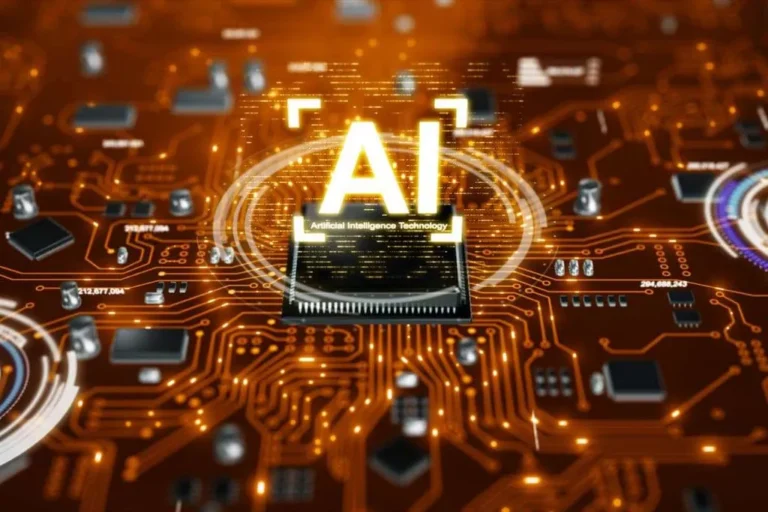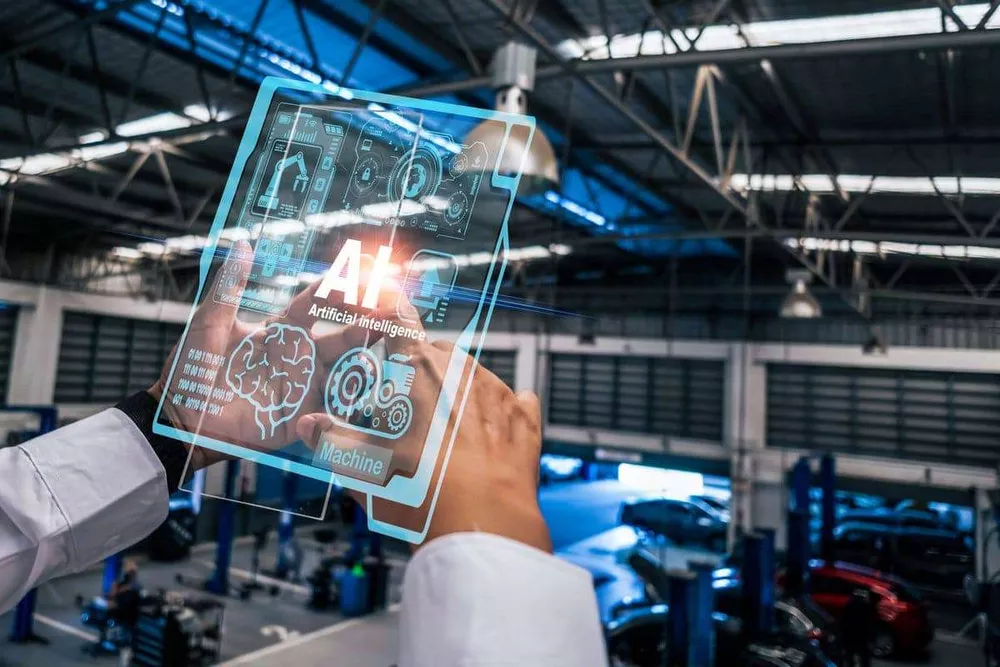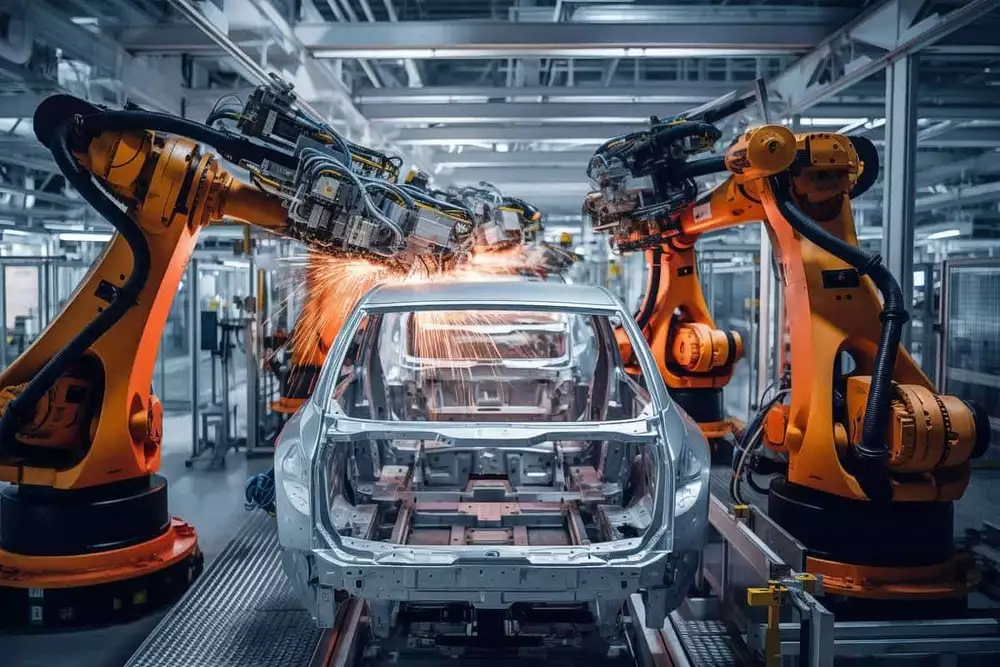Exploring Use Cases & Benefits of AI in Automotive Industry

Technology is advancing so quickly that a revolution in the automobile sector is imminent. AI holds a vital position in this process. It claims to upgrade automobiles, production techniques, and the driver experience with many cutting-edge technologies. Forecasts indicate that by 2030, AI in automobile industry will reach $15.23 billion. It’ll skyrocket at a compound annual growth rate of about 40%. In the article, we’ll go over the benefits of AI and how to apply it to the automotive sector.
What is AI in the Automotive Industry, and Why Does it Matter?
A top-notch technology known as AI has surfaced, enabling computers and programs to learn from data and make judgments. Such innovation presents several amazing opportunities for the automotive business. As Tractica informs, the motor vehicle AI software and hardware will reach over 27 billion dollars by 2025.
Raising the safety of autos, boosting connected cars work and, ultimately, traffic management, and as a consequence, cost savings in automotive industry — these are the primary reasons why you should invest in AI solutions as a business owner. Financing a rapidly growing AI in automotive industry brings high income and the opportunity to increase market share. More industries focus on AI. It’ll drive growth and sustain competitive advantage by streamlining operations and meeting changing customer demands.

We are confident that we have what it takes to help you get your platform from the idea throughout design and development phases, all the way to successful deployment in a production environment!
How to Use AI in the Automotive Industry: Top Use Cases
Given that AI promotes innovation and facilitates the car production process, its application in this sector cannot stay in the background. It enables automakers to raise quality and zero in on improved road safety and manufacturing productivity. Let’s explore how you may use AI in automotive industry.
Automation of processes
AI in automotive manufacturing comprises robotic machinery capable of carrying out tedious and complicated jobs like welding, assembling, and painting automobiles. AI robots boost output, cut down on mistakes, and raise the scale of production. Furthermore, you may take advantage of the digital twin technology. It allows manufacturers to identify potential process bottlenecks by simulating assembly lines.
Forecast and optimize production
AI and machine learning algorithms process great volumes of data. It comprises supply and demand data related to the manufacture of automobiles. AI forecasts future demand and maximizes production schedules. Automotive ventures, as an illustration, may benefit from Global Cloud Team’s experience in forecasting and optimization utilizing ML advancements to streamline automotive manufacturing processes, cut costs, and level up inventory control.
Predictive maintenance
Predictive maintenance is another way to use these innovations to your advantage. If you are a car owner or a manufacturer, you may save a lot of money because the procedure makes it possible to eliminate potential problems. Now, issues will not lead to downtime and significant financial losses. The system alerts in real time and offers preventive maintenance. It maximizes the life of the vehicle’s components. If you are an original equipment manufacturer (OEM), you may count on increased income from the sale of after-sales service and original parts.

Advanced Driver Assistance Systems (ADAS)
AI is the primary power source to many Advanced Driver Assistance Systems (ADAS) elements. You might park perfectly, drive with adaptive cruise control, use emergency braking, and stay in your lane thanks to these innovations. A network of sensors and artificial intelligence algorithms help to scan the area around the car continuously. So now you can detect any threats, improving security when you are behind the wheel. Perfect parking and collision-free driving are now within reach.
Autonomous and driverless cars
Since the advent of AI-driven autonomous vehicles, AI has received much attention. The tech uses computer vision, sensor scanning, and ML algorithms to evaluate the surroundings. Moreover, it makes judgments instantly and manages the self-driving cars’ performance within driving range. Experts estimate the industry of driverless cars will grow to over 2.3 trillion US dollars by 2030. Therefore, it’s essential to consider investing in technology development.
Sensor fusion and perception systems
Sensors are merging info from many sources. Algorithms combine and evaluate info to specify objects and forecast behavior, fostering quick decision-making. The integration helps progress driver assistance attributes like adaptive cruise control and pedestrian recognition, ultimately sprucing up the driving.
Voice control and navigation
Car navigation and voice control systems are also employed. Safe and more convenient driving is now possible since the driver can communicate with the onboard computer via voice instructions. ML and natural language processing are all vital for voice control and navigation systems. They use it to spot and understand the driver’s orders. On top of many other tasks, they can navigate routes, seek nearby locations, operate multimedia systems, and much more.
Data analysis
Machine learning algorithms can evaluate traffic statistics, weather predictions, information, and other variables to determine the best route and arrival time. It lets drivers plan their journey intelligently and avoid traffic jams. Additionally, depending on the analysis of info on fuel usage and vehicle condition, data analysis systems can help drivers determine the best time to replace the oil or fill up. The Global Cloud Team, as an illustration, has a wealth of big data and analytics knowledge that helps businesses take advantage of essential insights.
Robotics and automation
Given that robotics and automation benefit the automotive sector with efficiency, accuracy, and cost-effectiveness, they could be especially appropriate in the production of vehicles. These pieces are designed to identify material disparities and secure the workflow. The most recent research from Global Industry Insights projects that the motor vehicle robots field will reach a valuation of over $5.96 billion by 2024, up from its current valuation of over $4 billion.
Control quality and identify defects
Thanks to AI-powered data annotation, the industrial sector finds it more straightforward to detect and address problems, no matter how small or large. Resolving issues in cars early on and avoiding inaccurate or partial findings offers cost-effectiveness. Using AI-based data annotation techniques to find and correct issues during the production process, Global Cloud Team services may significantly improve quality control by preventing faulty outcomes.

Tips and Reminders for AI in the Automotive Industry
Before launching new technologies into multi-million dollar production, the executives in the automotive field need to follow these crucial rules:
- AI systems that can identify and communicate with drivers are essential to maintain driving safety in the face of distractions or fatigue. Using well-proven psychological theories or straightforward engagement techniques is crucial. AI assistants should be prepared to take over if drivers lose concentration to stem accidents. It mandates comprehensive datasets that cover a range of parameters. Developing specialized micromodels for natural language processing is a must for security protocols.
- Despite the initial risk, R&D investment is essential. Tech advancements are critical to the growth of auto brands, underscoring the need for long-term planning for brand distinction. To ensure success, IT executives should place a high priority on innovation.
- It’s critical to strike a delicate balance between being helpful and distracting while interacting with AI. Manufacturers should learn user reactions and feelings. Practical assistance might become a nuisance if they mistakenly believe that a blink indicates sleepiness and constantly warn the driver. Paying attention to these details makes a big difference in the customer experience as a whole.
AI has enormous potential when appropriately applied. Emotional and reaction analysis of drivers can improve in-car experiences. To redefine brand loyalty, automakers should strive to create distinctive AI-driven services. But maintaining safety, funding research, and providing customer-focused support remain the top goals.
Summing Up
The potential grows as AI in automotive industry continues to entwine itself with this field. It’s setting the stage to a more cost-efficient, secure, and customer-focused automotive future by boosting vehicle capabilities, manufacturing operations, and customer relations.
Adopting AI in the motor vehicle domain leads to forming several alliances with those businesses. Many businesses now create hardware and software tailored to blockchain products, sensor systems, autonomous vehicles systems, data management solutions, etc. The sector has a high demand for seasoned and trustworthy technological partners, and when the right fit is discovered, the partnership frequently lasts the long run.
The Global Cloud Team is your dedicated partner. It specializes in cutting-edge solutions tailored especially to automakers. Our vast experience with big data and analytics enables businesses to get insightful knowledge. We design our management software products with efficiency and streamlined procedures in mind. The automotive software development services offer options to anyone seeking sophisticated solutions for automotive navigation.
We can offer the necessary info and services while facilitating dealer-customer interaction since we are aware of the diverse customer demands. Creating extensive testing systems with email warnings, thorough reports, and real-time dashboard analytics is another area of our competence. Collaborate with us and reveal all the trends of the latest innovations in the AI domain.
Top Articles
What is Hyperautomation: A Comprehensive Overview of Key Components
I am here to help you!
Explore the possibility to hire a dedicated R&D team that helps your company to scale product development.






